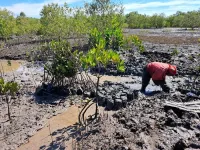(Press-News.org) RIVERSIDE, Calif. -- Quantum computing, which uses the laws of quantum mechanics, can solve pressing problems in a broad range of fields, from medicine to machine learning, that are too complex for classical computers. Quantum simulators are devices made of interacting quantum units that can be programmed to simulate complex models of the physical world. Scientists can then obtain information about these models, and, by extension, about the real world, by varying the interactions in a controlled way and measuring the resulting behavior of the quantum simulators.
In a paper published in Physical Review B, a UC Riverside-led research team has proposed a chain of quantum magnetic objects, called spin centers, that, in the presence of an external magnetic field, can quantum simulate a variety of magnetic phases of matter as well as the transitions between these phases.
“We are designing new devices that house the spin centers and can be used to simulate and learn about interesting physical phenomena that cannot be fully studied with classical computers,” said Shan-Wen Tsai, a professor of physics and astronomy, who led the research team. “Spin centers in solid state materials are localized quantum objects with great untapped potential for the design of new quantum simulators.”
According to Troy Losey, Tsai’s graduate student and first author of the paper, advances with these devices could make it possible to study more efficient ways of storing and transferring information, while also developing methods needed to create room temperature quantum computers.
“We have many ideas for how to make improvements to spin-center-based quantum simulators compared to this initial proposed device,” he said. “Employing these new ideas and considering more complex arrangements of spin centers could help create quantum simulators that are easy to build and operate, while still being able to simulate novel and meaningful physics.”
Below, Tsai and Losey answer a couple of questions about the research:
Q: What is a quantum simulator?
Tsai: It is a device that exploits the unusual behaviors of quantum mechanics to simulate interesting physics that is too difficult for a regular computer to calculate. Unlike quantum computers that operate with qubits and universal gate operations, quantum simulators are individually designed to simulate/solve specific problems. By trading off universal programmability of quantum computers in favor of exploiting the richness of different quantum interactions and geometrical arrangements, quantum simulators may be easier to implement and provide new applications for quantum devices, which is relevant because quantum computers aren’t yet universally useful.
A spin center is a roughly atom-sized quantum magnetic object that can be placed in a crystal. It can store quantum information, communicate with other spin centers, and be controlled with lasers.
Q: What are some applications of this work?
Losey: We can build the proposed quantum simulator to simulate exotic magnetic phases of matter and the phase transitions between them. These phase transitions are of great interest because at these transitions the behaviors of very different systems become identical, which implies that there are underlying physical phenomena connecting these different systems.
The techniques used to build this device can also be used for spin-center-based quantum computers, which are a leading candidate for the development of room temperature quantum computers, whereas most quantum computers require extremely cold temperatures to function. Furthermore, our device assumes that the spin centers are placed in a straight line, but it is possible to place the spin centers in up to 3-dimensional arrangements. This could allow for the study of spin-based information devices that are more efficient than methods that are currently used by computers.
As quantum simulators are easier to build and operate than quantum computers, we can currently use quantum simulators to solve certain problems that regular computers don’t have the abilities to address, while we wait for quantum computers to become more refined. However, this doesn’t mean that quantum simulators can be built without challenge, as we are just now getting close to being good enough at manipulating spin centers, growing pure crystals, and working at low temperatures to build the quantum simulator that we propose.
The University of California, Riverside is a doctoral research university, a living laboratory for groundbreaking exploration of issues critical to Inland Southern California, the state and communities around the world. Reflecting California's diverse culture, UCR's enrollment is more than 26,000 students. The campus opened a medical school in 2013 and has reached the heart of the Coachella Valley by way of the UCR Palm Desert Center. The campus has an annual impact of more than $2.7 billion on the U.S. economy. To learn more, visit www.ucr.edu.
END
With spin centers, quantum computing takes a step forward
New devices could help find more efficient ways of storing and transferring information
2024-07-11
ELSE PRESS RELEASES FROM THIS DATE:
Scientists release new research on planted mangroves’ ability to store carbon
2024-07-11
U.S. Forest Service ecologists and partners published new findings on how planted mangroves can store up to 70% of carbon stock to that found in intact stands after only 20 years.
Researchers have long known that mangroves are superstars of carbon absorption and storage. But until now, limited information existed on how long it took for carbon stored in planted mangroves to reach levels found in intact mangroves.
“About ten years ago, Sahadev Sharma, then with the Institute of Pacific Islands Forestry, and I discovered that 20-year-old mangrove plantations in Cambodia had carbon stocks comparable to those of intact forests,” ...
New immune cell therapy benefits laboratory models of ALS and has some positive results in an individual with the disease
2024-07-11
Immune system dysregulation and elevated inflammation contribute to the development of the fatal neurodegenerative condition amyotrophic lateral sclerosis (ALS), also known as Lou Gehrig's disease.
In new research published in The FASEB Journal, repeated infusions of certain immune cells delayed ALS onset and extended survival in mice, and also reduced markers of inflammation in an individual with the disease. The work was conducted by investigators at Massachusetts General Hospital, a founding member of the Mass General ...
Trial of cell-based therapy for high-risk lymphoma leads to FDA breakthrough designation
2024-07-11
CAR-T cell therapy, which targets a specific protein on the surface of cancer cells, causes tumors to shrink or disappear in about half of patients with large B-cell lymphoma who haven’t experienced improvement with chemotherapy treatments.
But if this CAR-T treatment fails, or the cancer returns yet again — as happens in approximately half of people — the prognosis is dire. The median survival time after relapse is about six months.
Now, a phase 1 clinical trial at Stanford Medicine ...
Major trial looks at most effective speech therapy for people with Parkinson’s disease
2024-07-11
A major clinical trial, led by experts at the University of Nottingham, has shown the Lee Silverman Voice Treatment (LSVT LOUD®) is more effective than the current speech and language therapy provided by the NHS, when treating patients with Parkinson’s disease (PD).
The results of the NIHR HTA funded trial, which are published today in the BMJ, showed that LSVT LOUD® was more effective at reducing the participant’s reported impact of voice problems than no speech and language therapy, as well as the NHS delivered speech and language therapy.
The trial was led by experts from the Universities of Nottingham and Birmingham, ...
Intensive voice treatment more effective than NHS speech therapy for Parkinson’s disease
2024-07-11
An intensive voice treatment developed in the USA and known as the Lee Silverman voice treatment (LSVT LOUD) is more effective than conventional NHS speech and language therapy or no therapy for people with Parkinson’s disease, finds a trial published in The BMJ today.
The researchers say the results emphasise the need to optimise the use of speech and language therapy resources for people with Parkinson’s disease.
Slurred or slow speech (known as dysarthria) is a common feature of Parkinson’s disease and can have a significant effect ...
NHS’s relentless focus on finance and productivity is failing patient safety
2024-07-11
“The NHS’s relentless focus on finance and productivity is failing patient safety,” argues patient safety commissioner Henrietta Hughes in an interview for The BMJ today.
“The patient’s anecdote is the canary in the coal mine,” she says. It’s the thing that tells us there’s something going wrong. But too often we hear about patients who have raised concerns being gaslighted, dismissed, and fobbed off.”
Hughes, a GP and former medical director at NHS England, became England’s first independent patient safety commissioner in September 2022.
The job was created ...
World leaders unite to embed social participation in health systems
2024-07-11
For the first time in the World Health Organization’s 76 year history, world leaders have unanimously committed to put social participation - people, communities and civil society - at the heart of health decision making processes.
This landmark pledge marks an important step forward in creating a healthy world, say experts in The BMJ today, and they urge everyone to seize their right to influence the decisions that affect their health and well-being.
Global challenges such as access to care, climate change, widening ...
AI Chatbots have shown they have an ‘empathy gap’ that children are likely to miss
2024-07-11
Artificial intelligence (AI) chatbots have frequently shown signs of an “empathy gap” that puts young users at risk of distress or harm, raising the urgent need for “child-safe AI”, according to a study.
The research, by a University of Cambridge academic, Dr Nomisha Kurian, urges developers and policy actors to prioritise approaches to AI design that take greater account of children’s needs. It provides evidence that children are particularly susceptible to treating chatbots as lifelike, quasi-human confidantes, ...
Dante on the Move: Refugee’s share experiences through the lens of 14th century poet
2024-07-11
International refugees and academic experts have contributed to a new book examining the resonance of Dante’s Divine Comedy with today’s migrants fleeing the troubles in their home countries.
Dante on the Move is launched in Rome today (Thursday 11th July) and has been produced as part of a research project Reading Dante with Refugees led by the University of Birmingham and Trinity College Rome. It features work by people from Afghanistan, China, Egypt, Iran, Iraq, Kurdistan, Ukraine, the USA and Venezuela.
Mohammed, a Kurdish refugee from Iraqi and contributor to the book survived a shipwreck in the Mediterranean in which many people drowned. He said: “Reading ...
Loneliness increases risk of age-related memory loss
2024-07-10
About a third of Canadians feel lonely, and a study from the University of Waterloo shows it has a greater negative impact on memory than even social isolation, though both present a significant risk to the aging population.
Loneliness is a subjective emotion that people might feel even while engaging in social activities. It is often associated with depression and an increase in stress hormones that may contribute to impaired memory.
Waterloo researchers examined four combinations of social isolation ...
LAST 30 PRESS RELEASES:
Buck Institute launches Healthspan Horizons to turn long-term health data into Actionable healthspan insights
University of Ottawa Heart Institute, the University of Ottawa and McGill University launch ARCHIMEDES to advance health research in Canada
The world’s largest brain research prize awarded for groundbreaking discoveries on how we sense touch and pain
Magnetofluids help to overcome challenges in left atrial appendage occlusion
Brain-clearing cells offer clues to slowing Alzheimer’s disease progression
mRNA therapy restores fertility in genetically infertile mice
Cloaked stem cells evade immune rejection in mice, pointing to a potential universal donor cell line
Growth in telemedicine has not improved mental health care access in rural areas, study finds
Pitt scientists engineer “living eye drop” to support corneal healing
Outcomes of older adults with advanced cancer who prefer quality of life vs prolonging survival
Lower music volume levels in fitness class and perceived exercise intensity
Of crocodiles, counting and conferences
AERA announces 2026 award winners in education research
Saving two lives with one fruit drop
Photonic chips advance real-time learning in spiking neural systems
Share of migratory wild animal species with declining populations despite UN treaty protections worsens from 44% to 49% in two years; 24% face extinction, up 2%
One in 20 babies experiences physical abuse, global review finds
Tundra tongue: The science behind a very cold mistake
Targeting a dangerous gut infection
Scientists successfully harvest chickpeas from “moon dirt”
Teen aggression a warning sign for faster aging later in life
Study confirms food fortification is highly cost-effective in fighting hidden hunger across 63 countries
Special issue elevates disease ecology in marine management
A kaleidoscope of cosmic collisions: the new catalogue of gravitational signals from LIGO, Virgo and KAGRA
New catalog more than doubles the number of gravitational-wave detections made by LIGO, Virgo, and KAGRA observatories
Antifibrotic drug shows promise for premature ovarian insufficiency
Altered copper metabolism is a crucial factor in inflammatory bone diseases
Real-time imaging of microplastics in the body improves understanding of health risks
Reconstructing the world’s ant diversity in 3D
UMD entomologist helps bring the world’s ant diversity to life in 3D imagery
[Press-News.org] With spin centers, quantum computing takes a step forwardNew devices could help find more efficient ways of storing and transferring information


